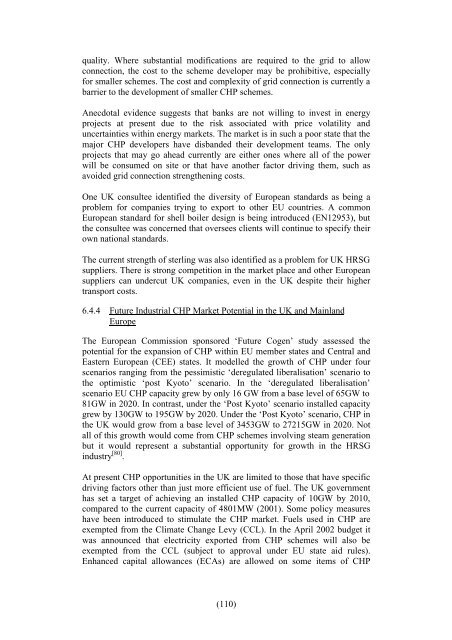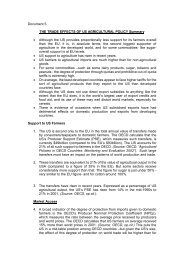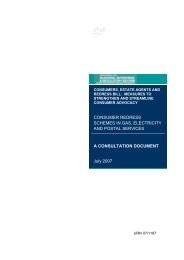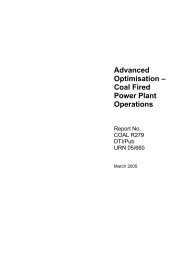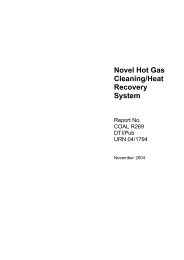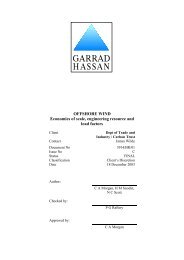(70) Therefore, the risk of sulphuric acid dew point attack ... - DTI Home
(70) Therefore, the risk of sulphuric acid dew point attack ... - DTI Home
(70) Therefore, the risk of sulphuric acid dew point attack ... - DTI Home
Create successful ePaper yourself
Turn your PDF publications into a flip-book with our unique Google optimized e-Paper software.
quality. Where substantial modifications are required to <strong>the</strong> grid to allow<br />
connection, <strong>the</strong> cost to <strong>the</strong> scheme developer may be prohibitive, especially<br />
for smaller schemes. The cost and complexity <strong>of</strong> grid connection is currently a<br />
barrier to <strong>the</strong> development <strong>of</strong> smaller CHP schemes.<br />
Anecdotal evidence suggests that banks are not willing to invest in energy<br />
projects at present due to <strong>the</strong> <strong>risk</strong> associated with price volatility and<br />
uncertainties within energy markets. The market is in such a poor state that <strong>the</strong><br />
major CHP developers have disbanded <strong>the</strong>ir development teams. The only<br />
projects that may go ahead currently are ei<strong>the</strong>r ones where all <strong>of</strong> <strong>the</strong> power<br />
will be consumed on site or that have ano<strong>the</strong>r factor driving <strong>the</strong>m, such as<br />
avoided grid connection streng<strong>the</strong>ning costs.<br />
One UK consultee identified <strong>the</strong> diversity <strong>of</strong> European standards as being a<br />
problem for companies trying to export to o<strong>the</strong>r EU countries. A common<br />
European standard for shell boiler design is being introduced (EN12953), but<br />
<strong>the</strong> consultee was concerned that oversees clients will continue to specify <strong>the</strong>ir<br />
own national standards.<br />
The current strength <strong>of</strong> sterling was also identified as a problem for UK HRSG<br />
suppliers. There is strong competition in <strong>the</strong> market place and o<strong>the</strong>r European<br />
suppliers can undercut UK companies, even in <strong>the</strong> UK despite <strong>the</strong>ir higher<br />
transport costs.<br />
6.4.4 Future Industrial CHP Market Potential in <strong>the</strong> UK and Mainland<br />
Europe<br />
The European Commission sponsored ‘Future Cogen’ study assessed <strong>the</strong><br />
potential for <strong>the</strong> expansion <strong>of</strong> CHP within EU member states and Central and<br />
Eastern European (CEE) states. It modelled <strong>the</strong> growth <strong>of</strong> CHP under four<br />
scenarios ranging from <strong>the</strong> pessimistic ‘deregulated liberalisation’ scenario to<br />
<strong>the</strong> optimistic ‘post Kyoto’ scenario. In <strong>the</strong> ‘deregulated liberalisation’<br />
scenario EU CHP capacity grew by only 16 GW from a base level <strong>of</strong> 65GW to<br />
81GW in 2020. In contrast, under <strong>the</strong> ‘Post Kyoto’ scenario installed capacity<br />
grew by 130GW to 195GW by 2020. Under <strong>the</strong> ‘Post Kyoto’ scenario, CHP in<br />
<strong>the</strong> UK would grow from a base level <strong>of</strong> 3453GW to 27215GW in 2020. Not<br />
all <strong>of</strong> this growth would come from CHP schemes involving steam generation<br />
but it would represent a substantial opportunity for growth in <strong>the</strong> HRSG<br />
industry [80] .<br />
At present CHP opportunities in <strong>the</strong> UK are limited to those that have specific<br />
driving factors o<strong>the</strong>r than just more efficient use <strong>of</strong> fuel. The UK government<br />
has set a target <strong>of</strong> achieving an installed CHP capacity <strong>of</strong> 10GW by 2010,<br />
compared to <strong>the</strong> current capacity <strong>of</strong> 4801MW (2001). Some policy measures<br />
have been introduced to stimulate <strong>the</strong> CHP market. Fuels used in CHP are<br />
exempted from <strong>the</strong> Climate Change Levy (CCL). In <strong>the</strong> April 2002 budget it<br />
was announced that electricity exported from CHP schemes will also be<br />
exempted from <strong>the</strong> CCL (subject to approval under EU state aid rules).<br />
Enhanced capital allowances (ECAs) are allowed on some items <strong>of</strong> CHP<br />
(110)


